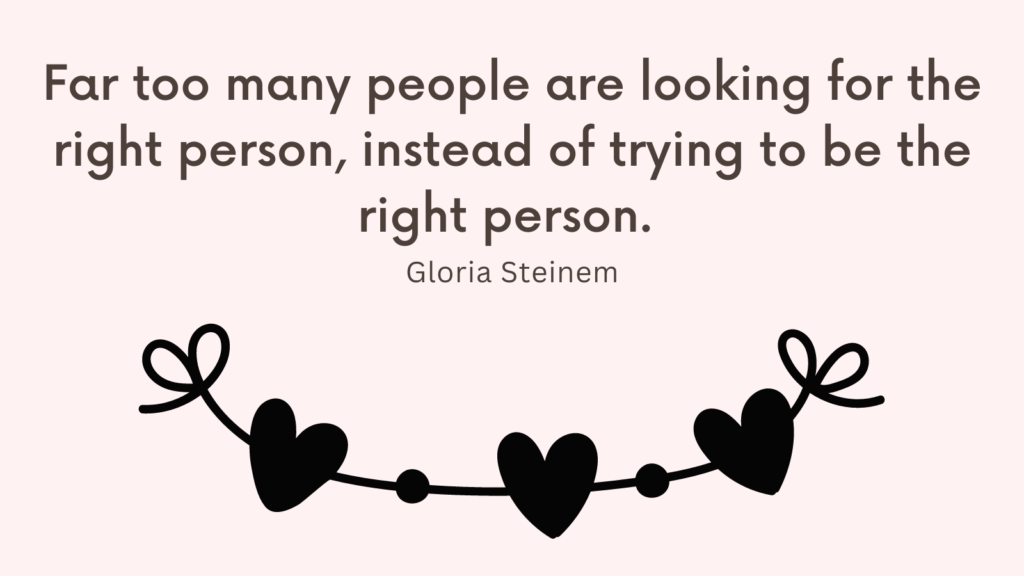In this post, you’re going to learn how to stop being emotionally unavailable and improve your relationship with yourself and others.
What Is Emotional Unavailability?
Emotional unavailability refers to a person’s inability or unwillingness to fully engage emotionally in a relationship.
It typically involves difficulty in expressing emotions, maintaining intimacy, and forming deep connections with others.
When someone is emotionally unavailable, they may struggle to communicate their feelings, avoid vulnerability, or have an emotional barrier that prevents them from fully investing in relationships.
This can lead to challenges in developing and sustaining healthy connections with others.
Emotional unavailability can stem from various factors, such as past traumas, attachment issues, or personal beliefs, and should be approached with understanding and empathy.
It’s possible that emotional unavailability can refer to how you relate to yourself.
When someone is emotionally unavailable to themselves, it means they struggle to connect with their own feelings and needs.
They may be detached, dismissive, or even avoidant of addressing their emotions or facing challenging situations.
Related: Am I Emotionally Unavailable Quiz
Signs of Emotional Unavailability
1. Avoidance of deep emotional conversations: Emotionally unavailable individuals tend to steer clear of discussing their emotions or feelings on a deeper level. They may deflect or change the subject whenever such topics arise.
2. Difficulty expressing emotions: It can be challenging for emotionally unavailable people to express their own emotions, leading to a sense of detachment or numbness. They may struggle to identify or articulate their own feelings accurately.
3. Fear of commitment: Emotional unavailability often manifests as a fear of commitment in relationships. This could involve being hesitant to enter into long-term commitments or constantly seeking distance or space.
4. Inconsistent communication and engagement: Maintaining consistent and genuine communication can be a struggle for emotionally unavailable individuals. They may frequently withdraw, become distant, or show inconsistency in their engagement with others.
5. Difficulty forming deep connections: Emotional unavailability can make it difficult for individuals to form deep and meaningful connections with others. They may struggle to establish trust, be emotionally vulnerable, or cultivate intimacy in relationships.
6. Strong focus on independence: An emotionally unavailable person may prioritize their independence above all else. They may be resistant to relying on or trusting others, preferring to handle their emotions and problems on their own.
7. Prioritizing logic over emotions: Emotional unavailability often leads to a preference for logical reasoning over emotional understanding. Such individuals may dismiss or downplay the importance of feelings and rely solely on rationality.
Related: Emotionally Unavailable Husband Quiz
Why Address Emotional Unavailability?
Addressing emotional unavailability is important for several reasons:
1. Improved Relationship Quality: Emotional availability is essential for building and maintaining healthy relationships. When one or both partners are emotionally unavailable, it can lead to a lack of connection, intimacy, and understanding. By addressing emotional unavailability, individuals can work towards creating more fulfilling and satisfying relationships.
2. Communication and Trust: Emotional unavailability often leads to communication difficulties and a lack of trust. By addressing these issues, individuals can learn to express their emotions effectively and openly. This can help build trust within relationships and create a safe and secure emotional environment.
3. Personal Growth: Addressing emotional unavailability involves understanding and processing one’s own emotions. This self-reflection can lead to personal growth and self-improvement. By becoming more emotionally available, individuals can develop a deeper understanding of themselves and their emotions, leading to increased self-awareness and overall well-being.
4. Increased Empathy: Emotional unavailability can hinder one’s ability to empathize with others. By working on becoming more emotionally available, individuals can develop empathy and compassion towards others’ experiences and emotions. This can enhance interpersonal relationships and foster a sense of connection and understanding.
5. Mental Health Benefits: Addressing emotional unavailability can have positive effects on mental health. It can reduce feelings of loneliness, isolation, and anxiety, and improve overall emotional well-being. Emotional availability allows individuals to form healthier and more fulfilling relationships, which in turn can contribute to improved mental health.
Related: Best 10 Books On Emotional Unavailability

How To Stop Being Emotionally Unavailable?
Becoming emotionally available takes self-awareness, effort, and dedication.
Here are some steps that can help you work towards being more emotionally available:
1. Recognize Your Emotional Patterns
Recognizing your emotional patterns requires self-awareness and a willingness to explore your own emotions.
One way to start is by paying attention to how you respond to different situations.
Do you tend to shut down and push people away when they express vulnerability?
Or do you find it difficult to connect with your own feelings and struggle to express them?
Taking note of these emotional patterns can help you understand why you may be emotionally unavailable.
For example, imagine someone close to you opens up about their struggles and vulnerabilities. Instead of showing empathy and support, you may unintentionally distance yourself or dismiss their feelings.
Recognizing this pattern can help you realize that you may have difficulty allowing yourself to be emotionally present for others.
Related: Best 8 Mindfulness Exercises For Adults That Will Help You Regulate Your Emotions
2. Understand The Root Causes
Emotional unavailability can stem from various factors such as past trauma, fear of vulnerability, attachment issues, or an inability to express emotions effectively.
For example, individuals who have experienced painful experiences in their past may build emotional walls as a defense mechanism to protect themselves from potential hurt.
Similarly, those with attachment issues may struggle with forming deep connections due to fear of abandonment or rejection.
It is essential to recognize these underlying causes and work towards addressing them.
Therapy or counseling can provide a safe space to explore and heal past wounds, allowing individuals to better understand and manage their emotions.
Related: How To Heal Abandonment Issues? Top 15 Powerful Strategies For Fear of Abandonment Healing
3. Connect With Yourself
Begin by taking the time to understand your emotions and what triggers them.
Journaling or talking to a trusted friend or therapist can be helpful in identifying patterns and gaining insight into your emotional landscape.
You may find the following prompts helpful:
- “Describe a time when you felt pure joy. How did it make you feel, and what were the circumstances surrounding that moment?”
- “Think about a recent situation that made you feel angry or frustrated. Explore those emotions in detail, considering what specifically triggered them and how they manifested within you.”
- “Reflect on a time when you experienced sadness or grief. What was the cause of these emotions, and how did they affect you mentally, emotionally, and physically?”
- “Write about a moment when fear or anxiety consumed you. Describe the sensations you felt in your body and the thoughts that raced through your mind during that time.”
- “Consider a time when you felt proud of yourself or accomplished. Dive into the emotions you experienced, and explore what it was about that achievement that resonated so strongly with you.”
- “Is there a specific person or place that consistently brings out strong emotions within you? Describe why this connection exists and how you typically feel when in their presence or thinking about them.”
- “Think back to a time when you felt overwhelmed or stressed. Explore the emotions that arose from that experience and the impact they had on your well-being.”
- “Write about a situation when you felt a sense of love or deep connection with someone. Describe the emotions you felt and the significance of that relationship in your life.”
- “Reflect on a time when you experienced guilt or shame. Dive into the emotions surrounding that event, and consider whether there are any lessons or insights that can be gained from that experience.”
Related: Self-Abandonment: Top 5 Ways To Get Back In Touch With Yourself
4. Develop Self-Trust
Trusting yourself enables you to be vulnerable and open in your relationships, fostering emotional intimacy.
To start building self-trust, it’s important to reflect on your past experiences and identify any negative patterns or beliefs that have contributed to your emotional unavailability.
It could stem from fear of rejection, past trauma, or a desire to protect yourself from hurt.
Once you’ve recognized these barriers, it’s essential to practice self-compassion and challenge your limiting beliefs.
The following prompts can help:
- How might your fear of vulnerability be limiting your ability to fully experience joy, intimacy, and authentic connections with others?
- Can you think of any situations where showing vulnerability has actually enhanced a relationship or connection with someone?
- What would happen if you allowed yourself to be vulnerable in a safe and supportive environment? How might that affect your relationships and self-growth?
- Are there any role models or individuals you look up to who display vulnerability? How has their openness impacted their lives positively?
- What steps can you take to gradually increase your comfort level with vulnerability? Is there a small, low-risk situation where you can practice being more open?
- How might viewing vulnerability as an act of courage and authenticity, rather than weakness, empower you to embrace it more willingly?
Related: Negative Core Beliefs List (& 8 Tips On How To Challenge Them)
5. Practice Active Listening
Active listening involves not only hearing the words someone is saying, but also fully understanding and empathizing with their emotions and experiences.
By actively engaging in conversations, you can build deeper connections with others and cultivate emotional availability.
Give your full attention to the speaker.
This means putting away distractions such as phones or other devices, making eye contact, and demonstrating genuine interest in what they are saying.
Offer verbal and non-verbal cues that show you are actively listening, such as nodding, summarizing their points, or asking follow-up questions.
By doing so, you create a safe and supportive environment where others feel comfortable opening up to you.
Related: How To Validate Someone’s Feelings Without Agreeing? (+Examples of Validating Statements)
6. Create Healthy Boundaries
Emotional unavailability often stems from past experiences, such as trauma or unhealthy relationship dynamics, which can lead individuals to distance themselves emotionally as a self-protective mechanism.
Recognizing this pattern can help you set healthy boundaries that will keep you safe while also emotionally available.
Creating healthy boundaries involves setting limits on what you are comfortable with emotionally, as well as respecting the boundaries of others.
Determine how much personal information you are comfortable sharing with others. It is okay to withhold certain details or topics until you feel ready to share them.
If sharing something makes you feel anxious, upset, or uncomfortable, it’s important to honor those emotions. Give yourself permission to step back and reassess whether it’s the right time or person to open up to.
Vulnerability can be emotionally draining, so it’s important to take breaks when you need them. Allow yourself time to rest, recharge, and process your feelings.
Related: What Do Boundaries Sound Like? + 35 Boundaries Examples
7. Seek Support
Recognizing that you struggle with emotional availability is already a significant milestone, and reaching out for support can make a world of difference.
Often, emotional unavailability stems from past traumas, unresolved emotions, or negative relationship patterns.
By seeking support, whether through therapy, counseling, or talking to trusted friends or family members, you create a safe space to understand and address the root causes of your emotional detachment.
A skilled therapist or counselor can guide you in exploring your emotions, developing self-awareness, and learning healthier ways to express and connect with others.
Sharing your journey with loved ones who are empathetic and understanding can also provide valuable support.
Remember that seeking support is not a sign of weakness, but rather an act of strength and courage to face your inner struggles and grow as an individual.
Related: Best 9 Tips On How To Receive More In Life And Relationships?

Conclusion
Addressing emotional unavailability is a process that requires patience, self-reflection, and sometimes professional support.
It is important to approach this journey with kindness and understanding towards yourself and others.



